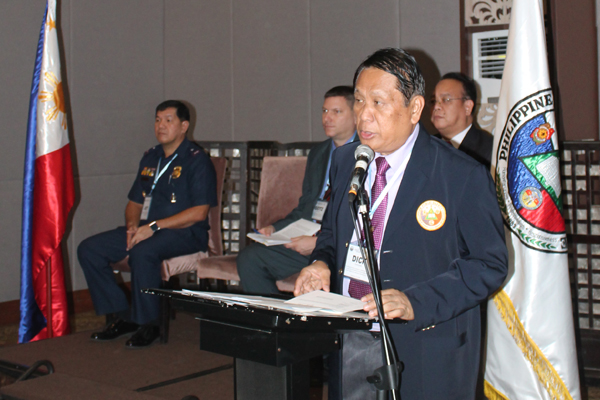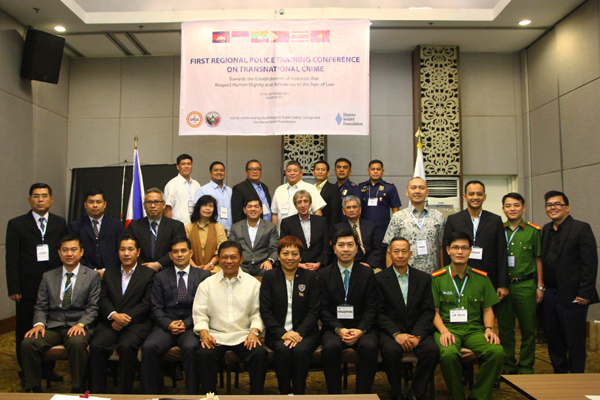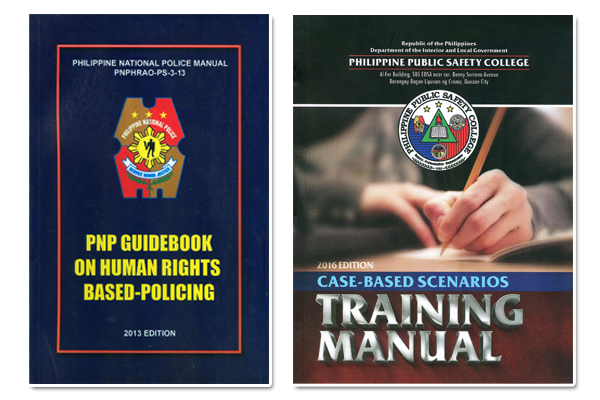Philippine Public Safety College hosts First Regional Police Training Conference on Transnational Crime

HSF
With the theme “Towards the Establishment of Protocols that Respect Human Dignity and Adherence to the Rule of Law,” the conference which was organized by the PPSC with the support of the Hanns Seidel Foundation (HSF) was attended by over 25 police education and training managers from Cambodia, Indonesia, Myanmar, Philippines, Thailand and Vietnam including representatives from ASEANAPOL.
Participants came from the Police Academy of Cambodia, the Education and Training Institution of the Indonesian National Police, the Training Division of the Myanmar Police Force, the Philippine National Police Training Service, the Philippine Public Safety College, the Royal Thai Police Cadet Academy, the Thai Department of Special Investigation, and Peoples Police Academy of Vietnam.
On the first day of the conference, after a general discussion on transnational crime issues in the Southeast Asian Region, the delegates described police training in their respective countries and how these address their country’s specific concerns on transnational crime issues. A listing of the countries’ transnational crime concerns relate to: border control, cybercrime, cultural heritage theft, environmental crimes, intellectual property violations, money laundering, piracy and armed robbery at sea, terrorism, trafficking in persons, trafficking in small arms and light weapons, and wildlife and timber trafficking.

HSF
Of the transnational crimes discussed, the four which are common to the delegates’ country-specific concerns are: cybercrime, illicit drug trafficking, terrorism, and trafficking in persons.
On the final day of the conference, the delegates agreed to explore common and related areas for police education and training particularly in response to transnational crime issues with emphasis on the four types of transnational crime concerns common to the countries represented. This effort includes continued cooperative undertakings and exchanges for improvement of the design, modification and innovations of related programs of instruction that are compatible with, and supportive of international agreements and protocols.
Specific recommendations made towards the end of the conference include having the results of this conference re-echoed in the forthcoming ASEANAPOL training consultative meeting on October 2016 in Kuala Lumpur, Malaysia, an exchange program among the different police education and training agencies in the region, annual collaboration/coordination/assessment meeting on training programs relating to transnational crimes, and visits to each other’s training academies/training institutions to see and adapt “best practices” therein.

HSF
Police Superintendent Supriyono, Head of the Sub-Division of Foreign Affairs Cooperation of the Education and Training Institution of the Indonesian National Police saw the activity as among the first few steps to foster regional dialogue among police education training institutions in an attempt to address transnational crime. “We may belong to different countries, but we are one in the region and will learn from each other,” he remarked.
Other participants saw the activity as an opportunity to network and exchange information with each other with the objective of developing a common training model. They added for a such as these be continued for the countries to share their experiences, best practices and success stories on the conduct of their respective training courses which address common transnational crime concerns.
At the end of the conference, the delegates affirmed their support to the initiatives of their respective police organizations and that of the ASEANAPOL to the region’s safety by fighting transnational crimes. Corollary activities include the enhancement of knowledge, skills and aptitude in accordance to global policing standards which promote and respect human rights and dignity, and adherence to the rule of law and good governance.
Upon the invitation of the Thai delegation, plans will be drawn for holding the second regional conference in Thailand in 2017 possibly with the participation of additional police delegations from the region.

The Hanns Seidel Foundation works with the police agencies in Indonesia, Myanmar, Philippines, Thailand, and Vietnam to promote regional dialogue and information exchanges among the countries’ police organizations to develop common solutions to regional concerns. In the Philippines, HSF has cooperative agreements with the Philippine National Police and the Philippine Public Safety College and provides technical and funding assistance in the conduct of human rights-based policing and practical case-based training, and the publication/production of training and information materials, among others.
